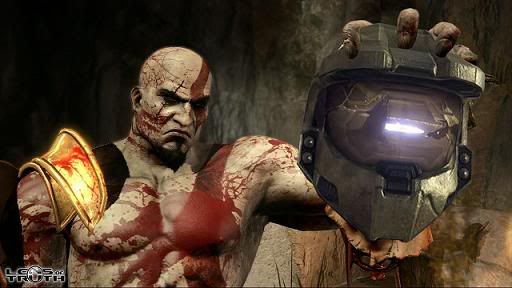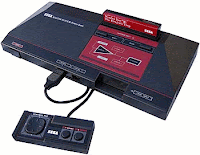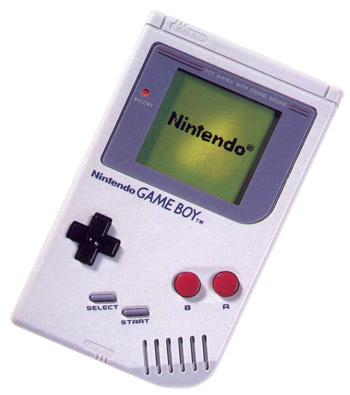The millennium and onwards. The days of the Playstation 2, Game Cube and Xbox and the end of my golden age of couch gaming.
 In the year 2000 Sony's Playstation 2 would emerge, competing with Sega's Dreamcast and effectively knocking out one of it's rivals . Following on a year later would be Nintendo's Game Cube. It was there first disc based console and was seen by many gamers as a children's console with the games produced for it. The Game Cube is also one of my most memorable consoles for multiplayer mainly for one single game; Super Smash Bros Melee. :)
In the year 2000 Sony's Playstation 2 would emerge, competing with Sega's Dreamcast and effectively knocking out one of it's rivals . Following on a year later would be Nintendo's Game Cube. It was there first disc based console and was seen by many gamers as a children's console with the games produced for it. The Game Cube is also one of my most memorable consoles for multiplayer mainly for one single game; Super Smash Bros Melee. :)In 2002 Microsoft joined the console business with the release of their Xbox. This was Microsoft's first console and was generally well received with it's technical specs. Microsoft sold the console at a loss to get grasp within the market. Shortly after the release of the Xbox, Bungie would give birth to one of the most popular FPS franchise of all time; Halo.
 And so this was about the time when I would hear many slandering between the fan boys of consoles (which gave me a giant headache).
And so this was about the time when I would hear many slandering between the fan boys of consoles (which gave me a giant headache). As time went on during the 2000s, there would be an increase of violent games garnered towards a mature audience.
As time went on during the 2000s, there would be an increase of violent games garnered towards a mature audience.Online play became a big part of gaming as it added a much more unique experience with multiplayer. The Dreamcast was considered the pioneer for online play on consoles. Every other console after would enable online play in some shape or form. Online play for the current gen consoles would allow large scale multiplayer games and would greatly add to a better multiplayer experience to game genres such as FPS.(Though there is always lag issues that people would be complaining about.)
MMOs became very popular and many MMOs would be made as the internet became much more accessible. World of Warcraft is only one MMO that I see many people lose their souls to and there are hundreds of MMOs out there such as Guild Wars, Final Fantasy XI, etc.
Moving onto the current gen of our time. The Xbox 360, Playstation 3 and Wii.
Microsoft's Xbox 360 would emerge from the depths first in 2005 followed by Nintendo's Wii in 2006 and finally in Sony's Playstation 3 in 2007. Each console created with online features such as DLC (downloadable content) heavily in mind. The PS3 and 360 are heavily focused with HD graphics and online play whereas Nintendo's Wii would rejoin the console war with innovative game play featuring motion sensored controllers. The graphics were said to be not much of an improvement from the Game Cube according to Nintendo themselves. Many gamers were alienated and was put off by the new style of gameplay. Nonetheless, the Wii shot up overtaking the rivals in sales.
 Sony and Microsoft generally kept the gameplay traditional with the control pads (although with some elements of motion sensor in the Dual Shock 3 and Six Axis). However up until recently have started to push to other areas such as Sony's Playstation Move motion controller and Microsoft's Kinect. With 3D technology advancing, the consoles are starting to integrate it within gameplay. This could lead to gamers becoming much more active in and could change the stereotype that is put upon gamers (even if it is another silly one :P)
Sony and Microsoft generally kept the gameplay traditional with the control pads (although with some elements of motion sensor in the Dual Shock 3 and Six Axis). However up until recently have started to push to other areas such as Sony's Playstation Move motion controller and Microsoft's Kinect. With 3D technology advancing, the consoles are starting to integrate it within gameplay. This could lead to gamers becoming much more active in and could change the stereotype that is put upon gamers (even if it is another silly one :P)Many companies in the industry (around 75%) are making a loss in profit. It takes considerably much longer and pricier to make a single game and it just isn't enough. Most companies go into debt and many suddenly go into liquidation. The pirates of games are also effecting the industry, and it seems the way things are going now, will be a very long time before game companies can try new things and create new games. Sequels are being made as they are (generally) seen as a safe way of gaining profit. With the gaming industry in a very tight situation with money and it seems it will stay this way for a while.
 |
| 'Professionals' in training :D |
My fellow game artists and I will most likely be graduated into it and it will be an extremely tough industry to get into. Even so, this will not stop me and many others on my course from bettering ourselves in every way as creative, professional artists and steeling ourselves for the rough, chaotic and dark industry ahead of us.


